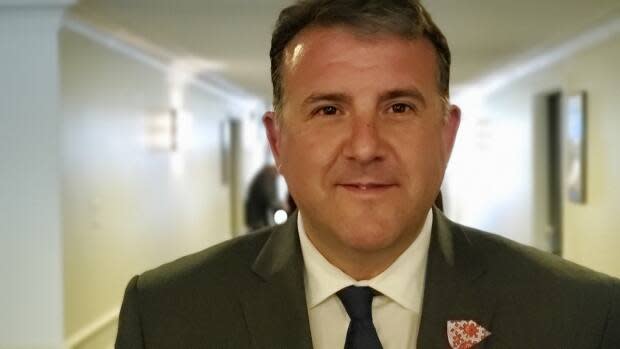N.B. government overhauls way it funds municipalities

New Brunswick is changing how it funds municipal governments, overhauling a decade-old formula as it prepares to implement local governance reforms in January.
Daniel Allain, the province's minister of local government and local governance reform, introduced legislative amendments Tuesday afternoon.
The changes will see a grant municipalities received phased out as the province shifts focus to an equalization program and partly funding regional service commissions, which take on more services.
"For the first time in more than 50 years, the local governance landscape has changed, and it requires a review to reflect the new structure," Ryan Donaghy, the deputy minister of local government, told reporters at a briefing before the bill was introduced.
Allain said during the briefing that the province heard municipalities and their associations calling for stability as major reforms take place.
He said that's why some aspects of the existing system will remain as others are phased out over five years. The province is committing to spend $75.6 million annually through the new system, a set amount for five years.
"We're trying to stop the highs and lows of municipal reform," Allain said.

The funding system in place since 2013 has what's known as a core funding component most communities received and an equalization grant that some received.
Equalization stems from the Equal Opportunity Program in the 1960s. Tax revenue collected by the province is distributed to communities with a lower financial capacity, so residents across the province have access to comparable municipal services.
"Fundamentally, the $75.6 million, what's it for? It's to make sure that we help — as the federal government does to the provinces — that we help municipalities that need not a hand out, but a hand up," Allain said.
While equalization will remain, the formula used to calculate it will compare a community's annual tax base growth to the provincial tax base growth.
Core grant to be phased out
The core grants will be phased out over five years.
Allain said that's because the province is giving communities the ability to set a local property tax rate on non-residential and heavy industrial properties at a range of 1.4 to 1.7 times the residential rate.
That leaves it to each community to make up for losses from the end of the core grant.
However, Allain said the funding isn't being cut but redirected.
Instead, it will go into a pool of money used to fund the expanded role of the 12 regional service commissions.
Commissions mandated to deal with things like garbage collection and land-use planning will take on regional economic development, tourism promotion, regional transportation and cost-sharing of recreational infrastructure.
Allain said some commissions had already started carrying out those tasks, but they all will now be required to provide those services.
The changes are likely to affect budgets in several of the province's largest cities that received millions in payments that will now be phased out.
Fredericton received more than $1.9 million as a core grant this year.
Figures released Tuesday show that would be reduced to about $1.6 million in 2023. Its regional service commission grant would be about $545,350.
The association representing the province's cities had called on the province to hold off on changes that would affect their finances until comprehensive tax reforms are implemented, something the province doesn't plan to start until 2024.

"We are very anxious to get that comprehensive tax reform in place before any of the equalization payments are changed," Moncton Mayor Dawn Arnold said Monday evening.
Last year, Moncton received nothing under the equalization side, but more than $3.2 million as a core grant. That will be reduced to $2.58 million next year.
"Any loss in revenues is something that we need to make up and it's something that the citizens of Moncton, the taxpayers of Moncton again would lose and they will need to make up the balance," Jacques Doucet, the city's chief financial officer, said Monday.
The changes will see the province adopt some of the 12 recommendations made by an expert panel in a report released last week, but ignore others.
Allain said the province had heard concerns from communities about fully implementing the suggestions at this point.
He said the formula the province is establishing should be reviewed in five years, but the legislation won't require that review.

 Yahoo Movies
Yahoo Movies 